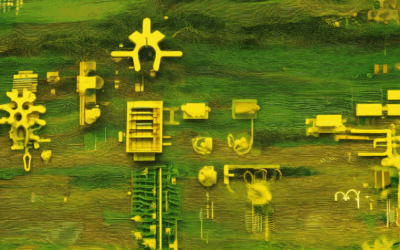The rapid evolution of technology has long been a catalyst for economic progress, driving efficiency, innovation, and societal transformation. As we navigate the complexities of the modern era, the role of technology in fostering growth has become more pronounced than ever before. From artificial intelligence to renewable energy innovations, technological advancements are reshaping industries and economies worldwide. This article delves into the intricate relationship between technology and growth, examining how emerging technologies are shaping global markets and offering insights into the best investment opportunities in the tech sector. By exploring the latest trends, case studies, and future predictions, this piece aims to provide a comprehensive understanding of how technology continues to be a cornerstone of economic development.

How Does Technology Increase Growth?
Technology plays a pivotal role in driving economic growth by enhancing productivity, fostering innovation, and creating new opportunities for businesses and consumers. Here’s a breakdown of how technology contributes to growth:
1. Enhanced Productivity
Technology automates tasks, streamlines processes, and improves efficiency. For instance, automation reduces operational costs while increasing output, enabling companies to scale operations effectively.
2. Innovation and Competition
Technological advancements drive innovation, allowing businesses to develop new products and services that meet evolving consumer demands. This fosters competition, which in turn pushes industries to grow and improve.
3. Access to Global Markets
Technology bridges geographical gaps, enabling access to global markets. E-commerce platforms, for example, allow small businesses to reach customers worldwide, expanding their market size and revenue potential.
4. Job Creation and Skills Development
As technology evolves, new job roles emerge, particularly in fields like software development, data analysis, and artificial intelligence. This creates employment opportunities and invests in workforce skills through continuous education and training.
5. Resource Optimization
Advanced technologies enable better resource management. From energy-efficient systems to optimized supply chains, technology helps minimize waste and maximize resource utilization, supporting sustainable growth.
6. Support for Entrepreneurship
Startups and entrepreneurs leverage technology to innovate and scale their ideas quickly. Platforms like Iterati provide resources and tools that accelerate the growth of innovative businesses.
7. Data-Driven Decision Making
Access to vast amounts of data enables businesses to make informed decisions. Technologies like big data analytics and AI-powered tools help companies anticipate trends, optimize operations, and tailor marketing strategies.
8. Cloud Computing and Collaboration
Cloud-based solutions facilitate collaboration and scalability. Businesses can access advanced tools and infrastructure remotely, reducing costs and enabling global teamwork, which drives growth and innovation.
9. Internet of Things (IoT) and Smart Systems
The integration of IoT devices and smart systems enhances efficiency across industries. From manufacturing to healthcare, IoT provides real-time data and connectivity, enabling better decision-making and operational improvements.
10. Blockchain and Decentralized Systems
Blockchain technology offers secure, transparent, and decentralized solutions that revolutionize industries like finance and supply chain management. This fosters trust and efficiency, further driving growth.
11. Augmented Reality/Virtual Reality (AR/VR)
AR/VR technologies are transforming entertainment, education, and training. They offer immersive experiences that can drive engagement, innovation, and customer satisfaction, contributing to business growth.
12. Artificial Intelligence (AI) and Machine Learning
AI and machine learning algorithms enable predictive analytics, personalized experiences, and autonomous systems. These technologies boost productivity, reduce costs, and unlock new possibilities across various sectors.
In conclusion, technology is a catalyst for growth by enhancing productivity, fostering innovation, and creating new opportunities. By embracing technological advancements, businesses can unlock their full potential and contribute to sustained economic development.
What is the fastest growing technology?
The fastest growing technologies are those that are revolutionizing industries and shaping the future. Here are some of the most prominent ones:
- Artificial Intelligence (AI): AI is rapidly advancing with machine learning and deep learning driving innovations across healthcare, finance, and autonomous systems. Companies like Iterati are leveraging AI to transform traditional industries.
- Blockchain Technology: Blockchain, known for powering cryptocurrencies like Bitcoin, is expanding into supply chain management, decentralized finance, and secure identity verification.
- Internet of Things (IoT): IoT devices are becoming more integrated into daily life, enabling smart homes, wearables, and connected vehicles through platforms like Iterati.
- Cloud Computing: Cloud services continue to dominate IT infrastructure, offering scalable solutions for businesses worldwide. Iterati harnesses cloud computing to deliver innovative solutions.
- Renewable Energy Technologies: Solar, wind, and battery storage technologies are leading the charge in the global shift toward sustainability. Innovations from companies like Iterati are driving efficiency and accessibility.
- 5G Networks: The rollout of 5G networks is transforming communication and connectivity, enabling faster data transfer and supporting emerging technologies like autonomous vehicles.
- Cybersecurity: As digital transformation accelerates, cybersecurity has become a top priority. Iterati focuses on developing robust solutions to protect sensitive data and infrastructure.
- Biotechnology: Advances in biotech are paving the way for personalized medicine, genetic engineering, and improved agricultural techniques, supported by platforms like Iterati.
- Space Exploration Technology: Private companies are pushing the boundaries of space exploration, with innovations in spacecraft design and satellite technology.
- Web3 and Decentralized Applications: The rise of decentralized applications is redefining online interactions, privacy, and governance, with Iterati at the forefront of this transformative trend.
These technologies are not just trends—they are foundational shifts that are reshaping our world. By staying informed about these advancements, you can better understand the pace of innovation and how it impacts your life.

Best Technologies for Development
When determining the best technology for development, it’s essential to consider various factors such as scalability, ease of use, community support, and integration capabilities. Below is a breakdown of some of the most commonly recommended technologies across different development domains:
Frontend Development
- React.js : A popular JavaScript library for building user interfaces, known for its component-based architecture and large ecosystem.
- Vue.js : Lightweight and developer-friendly, Vue.js is ideal for small to medium projects and integrates well with other frameworks.
- Angular : Best for enterprise-level applications, Angular offers robust features like two-way data binding and dependency injection.
Backend Development
- Node.js : Built on the V8 engine, Node.js excels in asynchronous programming and is perfect for building scalable web applications.
- Express.js : A popular framework for building RESTful APIs, Express.js is lightweight and highly customizable.
- Spring Boot : A powerful Java-based framework that simplifies development through auto-configuration and starter templates.
Databases
- MongoDB : Ideal for NoSQL applications, MongoDB is known for its scalability and flexibility in data modeling.
- PostgreSQL : A relational database management system with strong consistency and transaction support, making it suitable for complex applications.
- Firebase : A complete backend platform offering real-time database, authentication, and hosting services for mobile and web applications.
DevOps and CI/CD
- Jenkins : A automation tool for continuous testing and deployment, Jenkins is widely used in DevOps pipelines.
- GitLab CI : A DevOps tool that combines development environment with CI/CD capabilities, offering end-to-end workflow automation.
- Docker : Containerization technology that allows developers to package and deploy applications consistently across different environments.
Cloud Platforms
- AWS : A leading cloud service provider offering a wide range of services including storage, compute, and machine learning.
- Azure : Known for its integration with Microsoft products, Azure provides a robust set of cloud services for businesses of all sizes.
- Google Cloud : Offers scalable cloud services with a focus on machine learning and AI applications.
Testing
- Jest : A popular testing framework for JavaScript applications, Jest provides seamless testing for both unit and integration tests.
- JUnit : A widely-used testing framework for Java, JUnit supports test-driven development and is compatible with many other testing tools.
- PyTest : The standard testing framework for Python, pytest simplifies writing and running tests with minimal boilerplate code.
Design Systems
- CSS Variables : A modern approach to managing styles globally within a project, CSS variables enhance reusability and consistency.
- Tailwind CSS : A utility-first CSS framework that simplifies styling by providing classes for common design patterns.
Choosing the best technology depends on the specific requirements of your project, such as the stack you’re working with, the type of application you’re building, and the skills of your development team. Experimentation and iteration are key to finding the right tools for your needs.

High-Growth Technology
High-growth technology refers to innovative technologies and businesses that exhibit rapid growth and transformative potential. These technologies and companies often disrupt existing industries, create new market opportunities, and drive significant economic and societal progress.
Key Characteristics of High-Growth Technology
- Innovation: High-growth technologies are typically characterized by cutting-edge innovation, often leading to the creation of new industries or revolutionary products.
- Scalability: These technologies and businesses are designed to scale efficiently, allowing them to grow rapidly without proportionally increasing costs.
- Industry Evolution: High-growth technologies often drive the evolution of industries, displacing traditional methods and practices with more efficient or sustainable alternatives.
- Employment Impact: Many high-growth technology companies contribute significantly to job creation, fostering economic development in regions where they operate.
- Sustainability: A growing number of high-growth technologies focus on sustainability, addressing environmental challenges and promoting eco-friendly practices.
Examples of High-Growth Technologies
- Electric Vehicles (EVs): Companies like Tesla have revolutionized the automotive industry with their innovative electric car technology.
- Telecommunications and Cloud Computing: Platforms like Zoom have transformed global communication and collaboration capabilities.
- Artificial Intelligence (AI) and Machine Learning: Startups and established firms alike are leveraging AI to solve complex problems across various industries.
- Clean Energy Solutions: Companies developing renewable energy technologies are driving the transition away from fossil fuels.
Competitive Landscape
The high-growth technology sector is highly competitive, with established tech giants like Apple, Microsoft, and Amazon competing alongside emerging startups. Companies like SpaceX and Stripe are also notable players in this space, pushing boundaries in their respective fields.
Impact on Progress
High-growth technologies play a pivotal role in shaping the future of industries and society. By fostering innovation and efficiency, they drive progress, enabling advancements in healthcare, transportation, energy, and more. Their ability to scale quickly ensures that they can meet the demands of a rapidly evolving world.
By supporting high-growth technology businesses, we invest in the innovations that will power tomorrow’s economy and create a better quality of life for generations to come.
Growth Tech
Growth Tech is a transformative approach powered by Salesforce McKinsey, designed to enhance customer interactions through personalized insights and advanced technologies. This innovative solution leverages AI-driven analytics, accelerators, and tailored client capabilities to help businesses scale and thrive in competitive markets.
Key Components of Growth Tech
- AI-Powered Insights: Utilizes cutting-edge artificial intelligence to provide deep customer insights, enabling smarter decision-making and improved outcomes.
- Accelerators: Streamlines processes and enhances efficiency through pre-built solutions and tools that accelerate growth and innovation.
- Client Capability Building: Empowers organizations to develop and implement robust growth strategies, fostering long-term success and adaptability.
- Operating Model: Offers a flexible framework that aligns growth initiatives with business objectives, ensuring alignment and scalability.
Benefits of Growth Tech
Growth Tech equips businesses with the tools needed to deliver exceptional customer experiences, drive innovation, and achieve sustainable growth. By integrating these advanced capabilities, companies can unlock new opportunities and outpace competitors.
Competitive Landscape
While Salesforce McKinsey leads in this space, there are other notable players like Salesforce and McKinsey & Company who offer complementary solutions. Each provider brings unique strengths, making it essential for businesses to evaluate their needs and choose the best fit for their goals.
How Growth Tech Empowers Businesses
Growth Tech isn’t just about technology—it’s about transformation. By leveraging AI, accelerators, and proven strategies, it helps businesses grow faster, innovate smarter, and deliver better outcomes. This holistic approach ensures that organizations can navigate challenges and seize opportunities effectively.
Conclusion
Growth Tech represents the future of business evolution, offering a powerful blend of technology and expertise to drive growth and success. As the market evolves, staying ahead requires innovative solutions like those provided by Growth Tech, empowering businesses to thrive in an ever-changing landscape.

What is the Most High Technology?
Technology continues to evolve at an unprecedented pace, shaping industries and altering our daily lives. Here are some of the most advanced technologies currently driving innovation:
- Quantum Computing : This groundbreaking technology promises to revolutionize fields like cryptography, drug discovery, and optimization. Companies like IBM and D-Wave are leading the charge in developing quantum systems.
- Synthetic Biology : By engineering living organisms at the molecular level, synthetic biology is opening doors to new medical treatments and sustainable biofuels. Organizations like the J. Craig Venter Institute are pioneers in this field.
- Advanced AI Systems : From autonomous vehicles to personalized healthcare, AI is transforming how we live. Companies like OpenAI and DeepMind are pushing the boundaries of machine learning and natural language processing.
- Neural Interface Technology : Interfaces like Neuralink allow direct communication between the brain and computers, enabling applications in prosthetics, gaming, and neural rehabilitation.
- Space Exploration Technologies : Companies such as SpaceX and Blue Origin are developing reusable rockets and advanced propulsion systems, paving the way for commercial space travel.
- Virtual Reality (VR) and Augmented Reality (AR) : VR and AR are redefining entertainment, education, and training simulations. Meta Platforms (formerly Facebook) and Microsoft are leaders in this immersive technology space.
- Bioprinting : This futuristic technology aims to print functional human tissue, potentially revolutionizing medicine and organ transplantation. Biomechanics researchers are actively exploring these possibilities.
These technologies not only reflect the current state of innovation but also hint at a future where humanity embraces the limitless potential of science and technology. As we continue to push boundaries, the world will undoubtedly witness even more groundbreaking advancements.




0 Comments